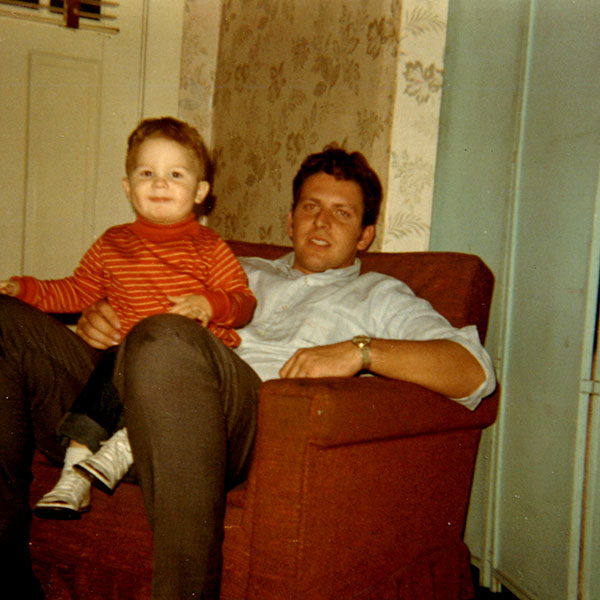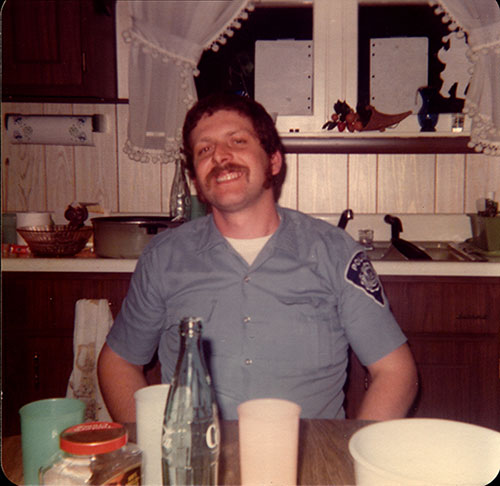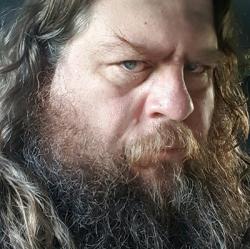
Troy Maynard spent many years angry at his troubled father (both pictured here), but that changed when Troy began having children and realized fatherhood wasn’t just putting “bad drawings on your fridge.” | Courtesy photo
You don’t get to choose what you remember about your dad. Mine wasn’t around a lot, and when he was — well, he wasn’t what you’d call a role model. So I never really learned to use tools, or tie a Windsor knot, or talk sports like all the other guys. But life is not all sports and tools. I like to focus on the good things he gave me, like my sense of humor, a joy of learning, and especially his amazing ability to see the wonder in everything, big and small.
My favorite memory of my dad is kind of dumb, really. I visited him only twice in California and one day he took me with him on a job. I rode in the van, climbed up the ladder onto the roof, and handed him tools. That’s a big deal to an eight-year-old boy.
I remember helping him feed a giant coiled-wire brush down into an exhaust pipe. It was a sunny day in Southern California, also known as the Mojave Desert. I remember the roof being extremely hot and we were both sweating. We drank lots of water and he gave me a salt pill. He said, “It’s good to take salt pills when you’re working out in the sun.” It was so cool. I still think salt pills are magical.
Lunch was Mexican. Living so near the border, he scoffed at the watered down, Americanized places. “Only real, authentic Mexican food for hard workingmen like us,” he said. For the life of me, I couldn’t tell you what we ordered. I just remember his eyes watering and his brow dripping with sweat, even more than when we were in the sun. “The sauce,” he said. “It’s super hot, but so good. You can’t get this kind of flavor without the heat.” I was in awe. He was my idol. To this day, I love eating all the hottest foods I can find.
I spent my 30s really angry at my dad for a lot of reasons, but mostly because he died. Just like when I was three years old, he had left us again. He died just as I started to have my own kids, right as I started to understand how hard it is and see how it’s not just cuddles and diapers and bad drawings on your fridge. He left before I could tell him that I finally understood how it pulls you down a little every day, how the weight of it can feel like it’s crushing your soul. I finally saw for myself how easy it would be to run away to California.

Of his dad, Maynard says: “I was in awe. He was my idol. To this day, I love eating all the hottest foods I can find.” | Courtesy photo
You can’t truly forgive someone until you know their struggle.
But for me, by the time I knew what to say, it was too late. Dad took his own life after decades of battling addictions and depression. It happened just weeks after we shared tears of joy when I handed him my first child, still shiny and wee. I can still see him looking at her with such intense affection, as if his heart would burst. She cooed at him, like a four-month-old baby does, and then rewarded him with diarrhea on his shirt. He whipped off his shirt without a word and held her to his chest, skin on skin. His smile never dimmed. It’s a wonderful memory that I will always treasure. It’s hard to believe it was our last time together.
Maybe that’s the price we pay for perspective and wisdom. Maybe it’s like hot sauce — you can’t get to the good stuff without the heat. Maybe it takes loss and pain to unlock the parts of us that need to be unlocked. Maybe his absence and inconsistency are what gave me my strength and persistence. Maybe I’m a better person because of his failures. Maybe it’s just easier telling myself that. Maybe I’m grasping.
Regardless, now I’m the dad and I’ll freely admit I’m not great at it. Sure, I try to pass on my humor and love of learning and a sense of wonder, just like my dad did. I’m also trying to teach my kids about tools and tying ties and sports, but it’s hard. Mostly, I’m showing up and hanging around and just being there.
Somewhere along the way I figured out that being a dad is not tools or ties or money or wisdom. It’s not what you say, it’s where you say it. It’s just being there for them.
So, here I am.
My kids love to hear stories about my dad. They howl at all the pranks he pulled and jokes he told and all the crazy amazing stuff he did. They love all the good parts, and they know him as the loving father he wanted to be. They’ll never know him like I did, not his pain or his anger or failures. But I want them to know his good side, to know his virtues. I feel I owe that to him, and I owe it to them. Mostly, I owe that to myself.
Lately my car tends to steer us toward authentic Mexican restaurants. Just last week my nine-year-old son tried some of my hot sauce and was surprised that I could eat something so spicy. “It’s super hot, but so good,” I told him. “You can’t get this kind of flavor without the heat.”
He looked at me with awe in his eyes. “I want to eat really spicy food, too,” he said.
“I know, son. I know you do.”
Let’s just say it’s a good thing my eyes were already watering.
[Some Like It Hot was originally published in Troy Maynard’s new book, How to Raise Viking Children and Other Tales of Woe (Very Vocal Press, 2017).]

